#born to be the 2d character love interest forced to be 3d in the real world
Explore tagged Tumblr posts
Text
I’ll be going “My Maannn” reading a fic
Like girl- he’s not even real
In the most literal way like he doesn’t exist
BUT FUCK
Can I just pretty please have Bokuto Koutaro irl??
Maybe Miya Atsumu???
PLEASE AT LEAST ONE OF THE FICTIONAL MEN PLEASEEEE

Image put together by me in my desperation
#bokuto x reader#bokuto koutarou#koutarou bokuto#i love him#I love anime men#miya astumu#miya atsumu x reader#guys he’s so cute#opm garou#garou#BOKUTOOO#that’s my man#my manz#haikyuu#haikyuu x reader#why isn’t he real#born to be the 2d character love interest forced to be 3d in the real world#he literally doesn’t even exist#would garou likely kill me or hate me if I was real yes however that’s not relevant
9 notes
·
View notes
Text
RAMBLINGS OF AN ANIMATION STUDENT ON THE BOSS BABY AND THE INDUSTRY ITSELF AND WHY I LOVE THE BOSS BABY WITH ALL MY HEART AND SOUL:
Words cannot describe the love I have for The Boss Baby. I saw an advanced screening of it a few weeks back with the director there & it blew my mind it’s like 3D animation meets 2D along with gorgeous art & so many opposites attract motifs like the baby acting like an adult & the graphic bold bright comic book feel type scenes that also meet this almost soft pastel 1950s/1960s vibe going on. AND THE EMOTION IN EVERYONES FACES AGH IT MAKES ME SO HAPPY AS AN ANIMATOR!!! It’s such a fast paced movie & everything happening at once & throughout all this everyone’s showing a variety of different emotions in a few seconds & the writing is amazing like not many animated films these days go back to the roots of traditional animation & just making it for a wide variety of an audience from all walks of life instead of making the same movie over & over again with great animation but a story line that seems rushed & choppy & not thought out but they keep making sequels anyways whether we wanted them or not just because m o n e y. I’m looking at u Disney with almost everything & Illumination with Despicable Me. It’s not to say that I don’t like sequels bc those companies have made some I enjoyed but it makes me disappointed when they could be putting their talents towards something fresh & new & original. This movie was o r i g i n a l in every sense of the word. Go take your kids to see it, yourself, your parents (I took mine & im a fully grown adult as are they & we loved it), your grandparents, your grandparent’s grandparents!!! It’s so great!!! It’s literally what the 3D animation community needed. I’m a traditional/2D animator myself & it seems more of the 2D movies out there recently have been trying to keep it original and don’t even get me started on the amount of work the animators do in not only 2D but 3D as well. But like recently 3D animation seems obsessed with the technology realizing they can make anything look more & more realistic nowadays then say when Pixar created Toy Story & their shorts in the 80s. These big companies keep churning out these movies not putting much thought into it & spending everything to make it look as real as possible. But that’s not the point of animation at all! They’re losing touch with why we animate in the first place!!! As my old storyboarding teacher once told our class on why we animate, we animate because it shouldn’t be possible in the real world. When you make anything animated you should stop & think: why am I making this story animated? Does it really need to be animated? Can I do this in live action? If you can make a story in live action then why are you animating it at all in the first place? It doesn’t need to be animated! Literally animation is just beautiful. You can do anything with it. And more & more especially with the technology in 3D films they’re slipping away from those values & ideas & making things that can be replicated in live action. So to see The Boss Baby really utilize the original concept of animation to tell that beautiful crazy impossible story & to top it off tell it through the bright eyes of an over imaginative child make it all the more better because it gives way to these big brilliant imagination sequences with these bold graphic designs that I’d die for. The editing and the animation in this movie is literally perfection it’s one thing flows into another into another into another & it works ANNND THERES EVEN GOOD COMEDIC TIMING!!! Sometimes movies live action & animated just can’t capture that kind of fast paced back to back tension followed by good comedic timing so to the writing team on The Boss Baby I say bravo to you & to the animators as well because God knows how difficult it is to draw out a normal sequence of actions but to follow the writing & get that vision out there in the open & follow it & draw it out so every detail works that’s just insane. This movie just inspires me so much & it’s relatable. My childhood was like Tim’s where everything was perfect & I was happy until my baby sister came along & we went at it for years. Another thing back to the genius writing in the film is this style where it forces you into Tim’s shoes because when they first introduce Boss Baby & for the first half of the film you’re made to hate him & he acts as the villain of the film until about halfway through Boss Baby really comes out of his 1 dimensional evil villain shell & just sees Tim in distress & reveals why it’s not only bad for Tim the current situation but why it’s bad for him too & then proceeds to give Boss Baby this insane narrative & beautifully tragic multidimensional backstory. Tim as the first main character has already been developed as a multidimensional character with different feelings & emotional expressions because he doesn’t know much about the world except for his imagination since he is a kid but by showing this then completely flipping everything on it’s head & giving Boss Baby real flaws & strengths that balance out Tim’s strengths & weaknesses it makes them seem a lot more like real relatable people & more so like siblings who depend on each other. As an older sister I can say some of my weaknesses end up being my sisters strengths & vice versa. Then by the end of the film,Boss Baby is this character you can't help but love & root for hoping he wins & can get out of the bad situations like when his formula was stolen so he kept going baby again it's like you feel panicked because you don't want Boss Baby to be normal you want him to be his crazy quirky self. Also this whole tragic narrative really hit me like it just stuck with me because I’m a sucker for these kinds of dark/sad stories layered in a brighter happier story & they coexist in harmony like that’s when you know a film’s really working. So SPOILERS AHEAD even though if you got this far there have already been some light spoilers I couldn’t avoid talking about but these get right into the grit of it. So the idea that Boss Baby was never really born fascinates me. In this world in the movie it makes sense. It’s also really sad as Tim points out as we’re finding out more about Boss Baby that he never had a childhood & how Boss Baby even says himself he was “born” or more so created (in both the universe of the movie & if he was self aware ((which he isn’t but for the sake of explaining this just humor the thought if he was)) that he was created as a character to work in this movie world realm plane of existence whatever you want to call it) all grown up as an adult in a baby’s body. Just think about that for a minute. What if you were born an adult & never went through childhood, never had a family, no one ever loved you or played with you or anything, all you knew was co-workers & business stuff. You never had fun or imagined things. That��s a really sad life if you ask me personally. He never had a chance to be creative or find himself all he knew was what the cold adult business school taught him from day 1. Most adults these days forgot what it was like to be a child & have fun & I think that’s what they were trying to get at with this backstory especially when Tim’s on the plane to Vegas with Boss Baby & just trying to teach him in small little ways how to use his imagination & just be a kid & not be so serious & black & white all the time. Also, I feel like that’s the issue sometimes with my own parents. As an animator I see animated movies as just another way of telling a story whereas people like my parents who don’t understand much from my line of work see it as a children’s media with no substance & pretty pictures. I want to break that barrier because the first animated pieces were NOT made for kids they were for other adults. I feel like it shouldn’t matter anyways if the movie’s marketed for kids because it could always be a good movie regardless of that & people like my parents forget what it’s like to have fun & see a good kids movie. They were kids once, we all were. As with many animated films before it, The Boss Baby brings subtle tasteful adult humor to the film as well as some just downright outrageous adult humor like Boss Baby running around butt naked with a censor bar over his nether regions. When you can marry adult & child humor together in a movie & make it work nicely it’s always a sign of a good movie. So tonight’s the opening night of The Boss Baby in cinemas everywhere & because I have so much love for this movie after seeing the advanced screening & listening to the director, producer, & designer from the movie speak about it & their own experiences they put into this film, like I stated before I dragged my parents out of the house on a Friday night when they would normally be in bed sleeping really early & shared the joy & beauty of the animated feature film with them. Normally my dad’s the one who will give almost any film a try & watch it & really like it. My mom however is extremely picky & if it doesn’t please her in the first 10 minutes or less she will zone out & fall asleep taking a nap through over half the movie. Both of my parents were on the edge of their seats tonight paying the utmost attention to the movie. It was a really beautiful moment to see my parents actually giving this animated movie a shot & they both ended up loving it as much I did on my second go seeing it. I’m not gonna lie I saw the trailers for this movie late last year & it caught my interest but I had this nagging thought that it wasn’t going to be a fresh new story it would just be typical & only made to make some money & keep Dreamworks in the game another year. I was happily proven wrong & this movie just takes everything about these money making no story movies & flips it on its head entirely. I even bought the art book for The Boss Baby because the artwork alone is enough to inspire me while working on my own projects. And that my friends is why you need to see The Boss Baby
TL;DR: The Boss Baby is an A+ gorgeously animated film with a breath of fresh air new story told in a way that’s really interesting & new & takes you back to the old days of 2D animation classics despite being a 3D film so disregard Rotten Tomato’s obviously wrong ratings & go see it for yourself because as an animator this movie makes me happy & I want to live in it forever ❤️❤️❤️
#the boss baby#the boss baby spoilers#animation#3d animation#2d animation#classic animation#animation student#movie review#new movie 2017#give all your money to the boss baby bc the good people at dreamworks who worked on this film deserve it all#dreamworks#dreamworks skg)
2 notes
·
View notes
Text
What I Thought Of Every Single Game I Played In 2016
I played a bunch of games in 2016. Here's what I thought about them, in a ranked order! This is my list, and if you have problems with me putting games released in previous years on it: fight me.
[2015]
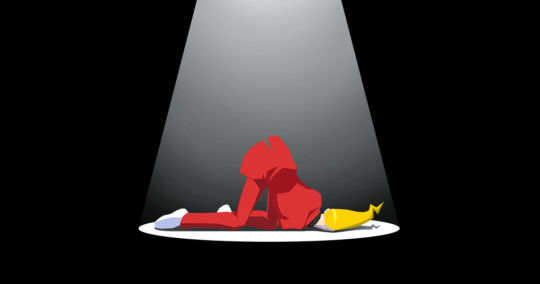
Honorable Mention: Ghost Trick: Phantom Detective - DS - ★★★★★ - 2011
Apropos of nothing, I replayed Ghost Trick this year. Man: Ghost Trick is still reaaaaally goddamn good. It's got style, it's got charm. Its bypasses the miserable scavenger-hunt aspects of traditional adventure games by focusing on self-contained environments with limited, obvious points of interaction that put the focus more on sequencing and logic than "well, I guess I'll use the banana on the duck." You spend a lot time thinking about umbrellas, how to knock umbrellas around, and the different shapes umbrellas can take. It made me understand why people like dogs that bark all the time.
This replay has definitely cemented it as my all time favorite adventure game. It's a shame we'll never see another of its ilk. It's some small consolation that the lack of interest in making a sequel prevents Capcom from ruining it with an ill-advised, poorly constructed follow-up. Let them keep milking Phoenix Wright half to death while their masterpiece rests on its mighty laurels. Oh Nick, your poor, poor teats. You don't deserve that kind of treatment.
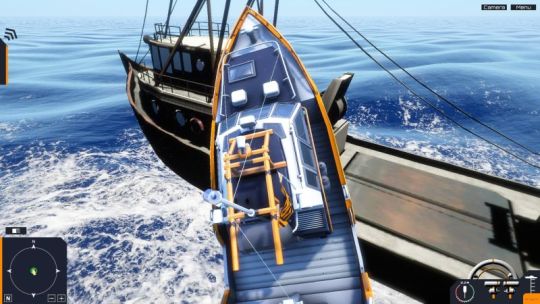
Coast Guard the Video Game - Steam - ★ - 2015
I have never been so disappointed in a video game.
I admit: this may seem a bit extreme. No one in their right mind would have any kind of expectations for Coast Guard: The Video Game. It's a bottom-of-the-barrel budget release created to capitalize on the fact that there's been literally no other game about the Coast Guard – the point where they literally were able to call the game "Coast Guard." A bunch of Germans made it on a shoestring German-game budget, and sitting on the title screen for longer than 30 seconds causes the whole thing to go haywire. I knew all this going in, and it filled me not with antipathy, but hope.
All I wanted was a game that was not only shitty, but also stupid; I wanted something that would be worthy of showing my pal Chorocojo, a member of the US Coast Guard, so that I could get some real good goofs. It didn't need to be good; it just had to be entertainingly bad and on topic. I just wanted to recapture the kind of inane shittiness that we I loved about Man vs Wild the Game.
The Man vs Wild game was bad. It was cheap. It was stuuuupid. But Man vs Wild was structured in a way that fit the experience. It's a budget title created by a team that knew that even budget titles need some bare minimum of production and gameplay. It doesn't waste your time. Coast Guard, for its stupid story and writing, has absolutely no respect for your time. It suffers the ultimate sin of media: being not only bad, but also plain boring.
Fuck this game.
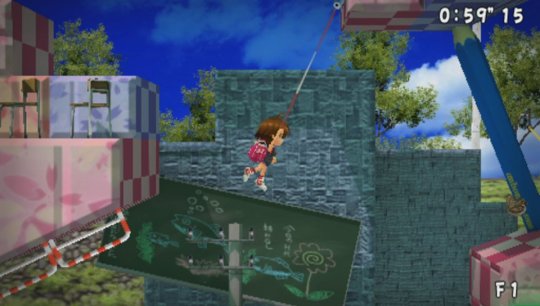
Sayonara Umihara Kawase - Steam - ★★ - 2015
I picked up the latest title in this reel old series of fish-avoidance fishing-pole-platformers because, frankly, seeing the older games on Game Center CX piqued my interest to see where they've taken the franchise in the intervening decades. Turns out? Not very far. The game is almost identical in every way to the older titles, just rendered in a more modern 3D engine. But boy is this package rough.
The controls are a nightmare. It crashed on me several times. I literally could not figure out how to beat the first boss. You'd think a platformer whose only point of interaction with enemies is "use fishing pole" would have a relatively simple to deduce first boss, but man, you got me. I tried hooking the thing, I tried going over the thing, I tried jumping the thing, I tried pulling the thing. After a half an hour of trying, I realized I really did not care for the game anyway so why bother? There are better uses of my time.
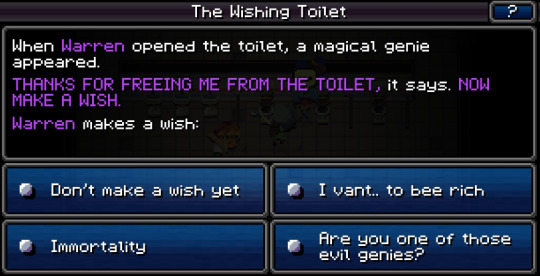
#19: Death Road to Canada - Steam - ★★★ - 2016
Death Road to Canada is... OK? It has some neat procedural design. It has the varied, challenging gameplay you'd expect from a zombie-shooting rogue-like. It's real goofy and doesn't take itself seriously, which is really the only way to handle zombie-apocalypse themed games in 2016. But man: I do not like how this controls. The two-dimensional sprite character look neat, but with how combat operates on a three-dimensional axis, it's frustrating. The forced perspective made it hard to just hit enemies directly above my character, and I fell prey too frequently to damage that arose less from misplay on my part as from an inability to predict how hit boxes work on what feels like an inappropriate aspect angle.
I think part of the issue is that I came to this game less from the perspective of "Hey, I like zombie games!" or even "Hey, I like roguelikes!" (though I've been known to enjoy both of those) but more "Oregon Trail II is a fucking dope game." I think what I wanted out of this was less "2D zombie loot brawler with Oregon Trail II" themes, and more "Another Oregon Trail: I guess there's zombies an anime in this one?" Wait, shit, someone should make an Anime Oregon Trail. Or an Oregon Trail Anime.
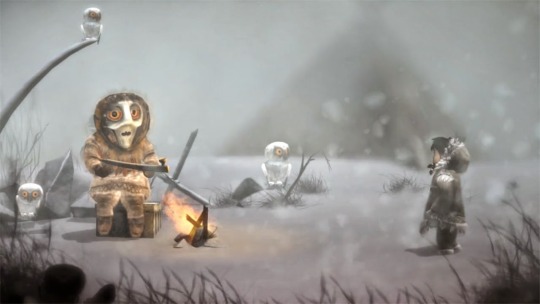
Never Alone - Steam - ★★★ - 2014
I appreciate what Never Alone is trying to do. Conveying the folklore of a culture an artistic video game is a brilliant idea, and the atmosphere that they create is fantastic. There's also a lot of interesting documentary material built in.
Problem is: the actual platforming isn't all that fun. Kind of frustrating, really. It's like a low-rent version of Brothers. What they've done is admirable and fine as an experience, but as a game it ironically left be rather cold. Worth experiencing if you're interested in the folklore side of it, but not really otherwise.
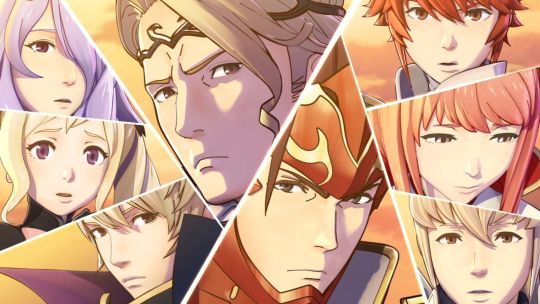
#18: Fire Emblem Fates - 3DS - ★★★ - 2016
I'm beginning to suspect I don't actually like Fire Emblem that much.
Here's the thing: My first entry in the series was Awakening. I enjoyed the tactical combat well enough, and the notion of managing the interactions of a really diverse, anime-ass cast was like a weird, omnidirectional relationship magician was neat! Combat scenarios were challenging but not too bad by and large, and the characters and writing were fun— if somewhat shallow. I managed to get through the combat with judicious reloading to keep everyone alive (which I blamed on my inexperience), though I was rather frustrated with just how little they actually managed to do with the cast. The way they had so many characters but none of them really interacted with each other unless you were setting them up to bone down— and none of them really had anything to really do with the ongoing plot beyond being another interchangeable unit in your altogether too oversized army.
After playing through the entirety of Birthright and most of Conquest, and with them really doubling down on the elements I didn't really like in Awakening, I'm really beginning to doubt what I thought I liked about this series. The difficult of combat scenarios are so dependent on minute variations of motion-capability and enemy movement which seem utterly unpredictable without either tons of iterations (ie, retrying a scenario over and over) or by plotting out actions with painstaking detail. The sheer amount of damage that can be done in a single turn is absurd, a reality made trickier by the game's love of introducing enemies in such an unpredictable way that you can be royally screwed if you don't know it's coming. Oh, you left a healer over near this tree? Surprise idiot, apparently a dozen wyvern riders were living in that tree! Birthright swung wildly between trivially easy / too simple missions and frustratingly badly constructed ones. Conquest had more interesting mission design, but they rewarded less tactical expertise and understanding of the systems than the constant-reload mindset required to keep everyone alive – and to ensure your party got enough experience to keep everyone alive down the line.
The writing for Fates is real fucking bad. The story is the most generic, milquetoast-ass warring kingdoms plot, and the way they attempt to throw a twist at is so surface level obvious that the existence of it was baked into their damn marketing campaign. An evil dragon is up to no good and causes a king to go do evil shit and there's literally nothing else it. Not a single twist along the way. I don't need deep literature here, but they need to do SOMETHING with the story beyond what they've been doing. The two games having diverging takes of the same story could have been interesting if it weren't for the fact that it's constructed on so flimsy a framework that in order for it to work it requires the cast to be biggest most stubborn morons imaginable— which really doesn't make me like them at all.
And boy do they really, REALLY struggle from their character's own mortality. Because any character— bar a few crucial exceptions— can die, characters cannot have any writing devoted to them outside the missions where they're recruited, certain character-specific missions, and their ten paragraphs of support dialog in the castle. Because everyone can die at any given point, writing conditional dialog that may not be used would be a waste of the developer's resources / potentially alter the plot- meaning no one actually has any time to build any real character. This is made all stupider by the fact that the game for whatever reason also maintains Awakening's children-generating mechanic, which is spuriously supported in this game by using fast-time bubbles your children are raised in so that they can fight in your army within a day of you getting married / them being born. It's fucking stupid, and they refuse to even tip the tiniest hat to acknowledge it.
The sad part is, I don't think there's much hope in much of this being changed going forward. Permadeath is considered a "core feature" of the Fire Emblem series that grognards love to argue about, and the fundamental combat system has become increasingly more frustrating the more and more I learn it, rather than the other way around. This whole series and paradigm feels like it could learn a lot of what BioWare has done with its own relationship-heavy RPGs, and maybe dial the cast back a bit and put a bit more time into increasing the quality of the writing. Not going to happen though.
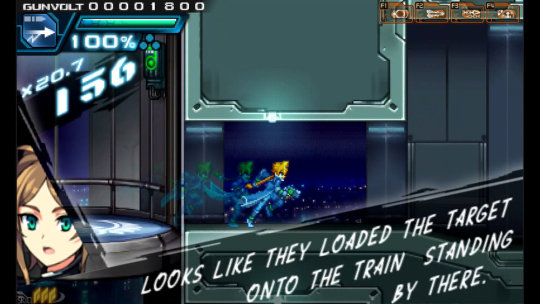
Azure Striker Gunvolt - Steam - ★★★ - 2015
Here's a secret about me that you may not know: I like anime. Quite a bit, actually. I've watched a lot of anime. I devoted perhaps too much mental energy during crucial years of my life towards anime. My brain is irreparably wired for it. I cannot escape it. I am anime.
And as much as the anime ideal in my head differs wildly from the style of Azure Striker Gunvolt, I don't dislike having a really stereotypical-ass neon-colored anime romp now and then. That being said: Azure Striker Gunvolt is not an especially good one of those. The story is Mega Man meets X-Men meets Idol music numbers, with very little of what would make all of that any good. The bad guys you face somehow have less character than even ostensibly mindless Mega Man bosses, and the story is way too sparse (and no good) for as much weight as it wants to give it. The music numbers are pretty OK though.
The tag-and-zap system of Gunvolt and its interplay with platforms and dodging enemy fire is interesting and certainly more complex than Mega Man's old run-and-gun, but it's ultimately Gunvolt's downfall as well: it actually requires a bit too much deliberate thought and action to work well. Mega Man, across so many of its platforming-focused instantiations, has been less about precision and more about flow. While the platforming may occasionally be very precise, and they are definitely not mindless games, you still ultimately spend most of your time just holding right and dealing with challenges as they come. It's platforming by gut and feel. Gunvolt rewards precision and punishes slack. It rates you at the end of every mission and basically yells at you if you can't maintain a combo and dodge fire the entire mission. The game expects you to replay the missions and aim for perfection, but I don't feel the mechanics of Gunvolt are good enough to even consider putting that kind of time of mine in. Good for those that do, but nope.
Also, for some reason the US version had a bunch of story shit cut which makes the game even more incoherent. Bizarre.
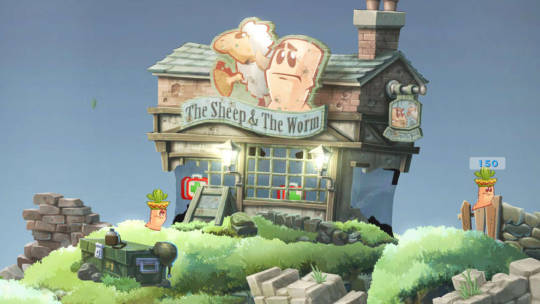
#17: Worms W.M.D. - Steam - ★★★ - 2016
It's still really fun to import art into Worms and then blow it up. WMD isn't substantially different from Reloaded (which I also liked well enough), but it has enough quality of life improvements and new features that I still enjoyed my time with it playing against my friends. This is about all I want from it. Congrats Worms, you managed to make it this far just from "I enjoy fucking around with my friends".
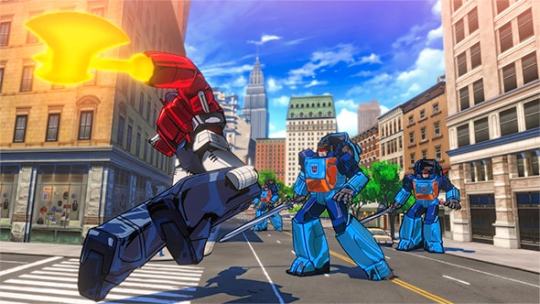
Transformers: Devastation - Steam - ★★★ - 2015
One of the weird twists of a kind of strange, sort of shitty year was me being exposed more to and getting really into Transformers. I really like the Transformers. I used to not give a Cybertronain shit about these guys but man I get it now (thanks entirely to IDW's great line of Generation 1 comics). Transformers: Devastation is just a big ol' fanservice send up to Transformers from Platinum Studio's B team. Luckily for me, I really like Bayonetta and similar titles from Platinum's menagerie, so a Transformers game with those mechanics sounded pretty great!
And for what it is, Transformers: Devestation IS pretty great. But that "what it is" really just amounts to a budget tie-in game that slaps a mediocre weapon looting system and a simpler version of the Bayonetta combat onto the old generation 1 Transformers license. If you're willing to accept that for what it is and march through four hours or so of somewhat-repetitive encounters so that you can have Optimus Prime punch Megatron in the face in low-earth orbit, it's a good time. It's not exactly something I'd recommend to anyone not into either Transformers OR character action games, but if you like either (both?) of those things, this is a decent enough.
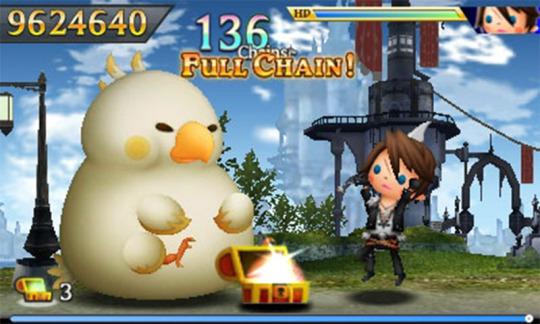
Theatrythm Final Fantasy: Curtain Call - 3DS - ★★★ - 2014
I liked the previous Theatrythm Final Fantasy game for the 3DS well enough. The Final Fantasy series has catchy tunes, playing through them in a vaguely Ouendan manner is fun. This game adds a whole heap of new songs from across the series that wasn't in the previous game, and adds another heap of new characters for exploring the expanded RPG elements (particularly, their quests). The music and rhythm parts are fine, no real objections with those. My big problem with this game is that the RPG elements still have no purpose. Yes, they allow you to get "further" through enemy sequences, get more points or prizes, or stumble through badly performed sections longer - but to what end, really? The major driver for the game when you get down to it is the desire to unlock the characters from across the different series by collecting colored crystals, but there's not a lot of point to this past a desire for completion or to see your favorites. I got my favorites rather quick, and after that the act of actually using and improving those characters felt... empty? It's rather shallow and short lived because they don't really do anything. Each character's unique traits and skills don't serve any other end beyond the numbers getting bigger and bigger, or allowing you to hobble your way through higher difficulties that you may not be able to keep up with.
The RPG aspect is a tacked on element to make their rhythm game more "Final Fantasy", when the game would have been much better served as an RPG that integrated rhythm-based execution of songs into its combat / navigation structure. Their quests play at this kind of idea, but don't actually implement the mechanics in such a way that makes it anything beyond just another way of presenting a randomized sequence of the three different rhythm mini-games— and those mini-games just aren't nearly as well executed as the kind you encountered in Ouendan or Elite Beat Agents in the first place.
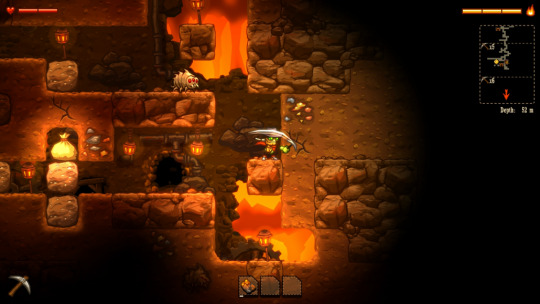
Steamworld Dig - 3DS - ★★★ - 2013
Steamworld Dig has a very simple but effective draw: digging deeper to get materials to upgrade your tools to dig deeper to get materials to upgrade your tools to dig deeper to get materials to upgrade your tools is a fun gameplay loop. It's a huge part of what makes Minecraft and its ilk appealing. It targets the weird portion of our lizard brains focused on letting us know that even menial labor can be appealing if you feel like you're slowly accomplishing something.
Steamworld Dig is a great example of how that loop can play out, but that's about it. Its plot is essentially a placeholder, and while it has a mild amount of platforming mechanics for handling its occasional puzzle side levels, none of it really helps it get past being just a digger game. But for a short, cheap game, it's good enough.
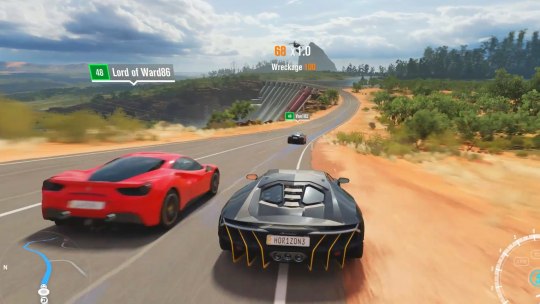
#16: Forza Horizon 3 - PC - ★★★ - 2016
It's good to drive a car now and again. I'm not really into these sorts of games much for the racing; it is fine, I don't dislike doing it. Driving faster than other cars in a loop and getting ahead because I drive like a fucker is good. But really I just want to drive around a world far-too-fast and just look at it. Forza Horizon 3 is pretty good for that. The driving feels real good, the cars are fun, and the environment is diverse and interesting.
... but unfortunately, given what I wanted out of the game has less to do with racing and more to do with the environment itself, it is a bit lacking in terms of the longer-term appeal. It actually didn't take long to see all of what they had going on in their tiny Australia; while the environments are diverse, they're actually pretty small. I guess I just wanted something bigger. Forza-style driving in a The Crew-sized world would have been amazing, for example. The big attraction of Forza Horizon 3 is its online features, but frankly I don't have any real interest in that kind of thing; I'm here to treat it as basically a podcast game.
As a side note: the special unique racing events you unlock over the course of the game are actually not that great? As it turns out, racing a train, or some boats, or a helicopter really isn't all that different; they're just time trials with some neat set dressing. The fact that they're basically your reward and motivation for winning a bunch of races is kind of daft. They could do better.

#15: American Truck Simulator - Steam - ★★★ - 2016
Speaking of liking-to-drive while zoning out: man is it fun to drive a truck around the southwestern United States. As I talked about last year with Euro Truck Simulator 2, it's good to have a low-impact simulation that you can just load a podcast or some music on and drive. Problem is: there's way too little of it! If you want me to enjoy driving around you gotta give me more of the country to work with.
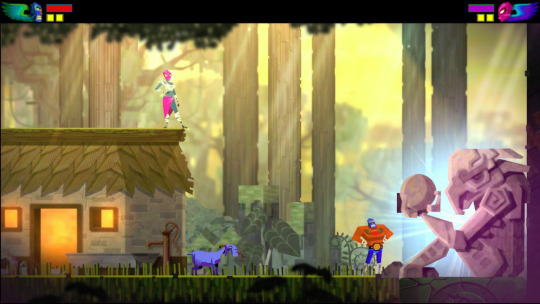
Guacamelee: Super Turbo Championship Edition - Wii U - ★★★ - 2013
I really wanted to like Guacamelee more than I do. It's a Metroidvania, which is possibly my favorite gaming genre. It has a great aesthetic. I fucking adore Mexican culture as an aesthetic for fantasy, and Guacamelee has that in spades with its luchador hero-myth, its underworld cast, and its overall world design. It's just got a great, unique feel that jives great with their combat system.
But I REALLY dislike the writing in the game, especially their attempts at comedy. Apparently this is the version where they toned down the amount of meme-y billboards and game references, but holy shit are there still WAY too goddamn much. It feels like nearly every single screen has a reference to old video games taped to the wall, and every single time it takes me completely out of the experience. Games NEED cohesiveness to sell you on their world, and each element should ultimately serve that cohesive whole— or at the very least, not detract from it while doing their own thing. The sheer amount of constant reference-based humor combined with overall just generally mediocre writing, made me cold on the experience.
While the combat was certainly unique and it worked overall pretty well with their arena combat, it just didn't feel all the way there. After a while it just got dull, and instead of varying my moves I started to just rely on tried-and-true combinations to get it done. This was in part due to a number of mechanics being introduced which, while certainly making the combat more dynamic, weren't actually all that fun in the actual flow of things (looking at you, dimension hopping bad guys). Towards the end it began to remind me of the Wolf Link segments of Twilight Princess, which isn't the most ringing of endorsements.
The game as a whole is decent with glimmers of brilliance—, it's just a real shame that there are so many weird inclusions that prevent it from achieving a truly timeless greatness. As a side note: the requirement for getting the "best ending" was stupid and, ultimately, really not that fun to do. Then again, the bad ending is arguably a better one than the "best ending", so that may be beside the point.
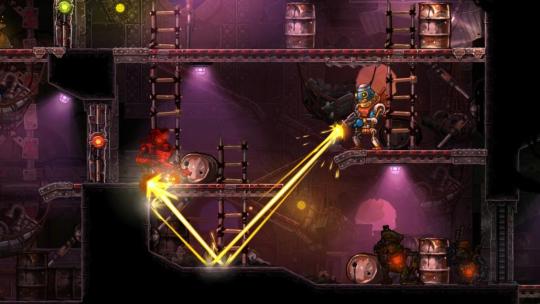
#14: SteamWorld Heist - 3DS - ★★★★ - 2016
It's absurd that this game works. The very notion of a 2D XCOM-like just seems like a bad idea? Or just be too simple? SteamWorld Heist is not a super complex game, but what's there is actually incredibly fun. The different class-based abilities paired with the weird guns and hat-removing laser-sight-aiming combat us super interesting. The story and world were pretty forgettable, but the actual combat and missions were varied enough and interesting that I had a good time with it. The hat collection mechanic is such a stupid good idea; the risk reward of "wow that's a different hat, do I take a turn off to shoot that hat off to try to collect it while I'm being shot at?" is both goofy and an interesting complication to the tactical combat.
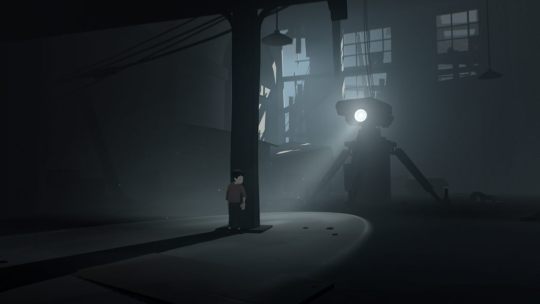
#13: Inside - Steam - ★★★★ - 2016
Inside has a very effective and affective atmosphere. It's dark, it's mysterious, and while playing it I had absolutely no fucking idea what was going on. Hell, after finishing it I still have no fucking idea what was going on, and I'm usually pretty good at sussing out this kind of thing. While it is nominally a puzzle-platformer, the puzzles and platforms really only exist to sell the mood and setting and get you asking what's going on, until you reach the final twist where they really throw the whole thing for a loop. It's a good, self-contained experience, though I did not find it nearly as affecting as others did.
The final twist seems like it'd be more impactful if you are particularly susceptible to that style of horror; to me it was mostly just a cool thing that ended a bit too soon, with too many answers unanswered. A microcosm of the game as a whole, really.
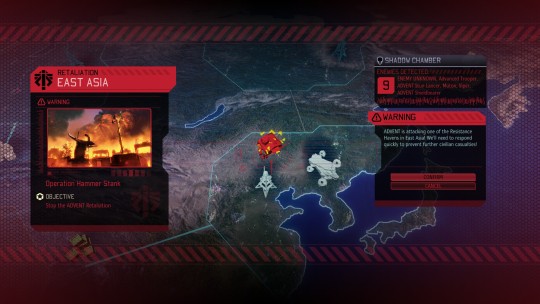
#12: XCOM 2 - Steam - ★★★★ - 2016
XCOM 2 is... weird. In so many ways it's XCOM But More, which sounds great. The increased customization in terms of character designs, loadouts, and team composition, and the increased variability in mission-style, enemy types, and the overall flow of combat should have made it just an immediate total improvement on XCOM 1. But the story as executed really wasn't different enough (or interesting enough) compared to its predecessor, and the overworld strategic element ended up being more frustrating than I think they intended for.
The real crux of this seems to come down to their focus on ticking clock elements to solve the gameplay problems of the first game. There are just too many time-based fail states, both in and outside of missions. I get why they're there: to force you to keep moving forward and take risks rather than playing it totally safe and defensively, as the game's mechanics would otherwise encourage you to do. The natural inclination when you can be surprised at any given moment and lose valuable soldiers is to play it careful and wait for the enemy to come to you, so making that not an option by forcing to keep moving towards the exit is a great idea in principle. But the actual result is so punitive if you fail to adequately perform due to any number of XCOM-esque unpredictable events ("SURPRISE YOU WALKED INTO AN AMBUSH OF 20 DUDES", "Surprise you got bogged down and lost your whole team before you could evacuate", "Surprise you misjudged the arbitrary overworld clock and just lost the whole game!") that it narrowly misses the point of XCOM. XCOM is supposed to be punishing, but XCOM is more about coming back from the brink than it is supposed to be about avoiding punishment. You're supposed to keep soldiering on. The timer-elements put too much focus on punishment avoidance than on just pulling through the constant struggle. It addresses people playing too safe by forcing them to play risky in order to play it safe. The end result is that gameplay is often times stressful, and not necessarily in a good way. Which is a shame; the actual improvements to base XCOM are by and large GREAT. I had a fantastic time playing XCOM 2, but I am not exactly itching to go back for another run like I was with XCOM. If they had just made some different design decisions, and had more time to polish the game and bug-fix, I could have seen this game much higher on my list.
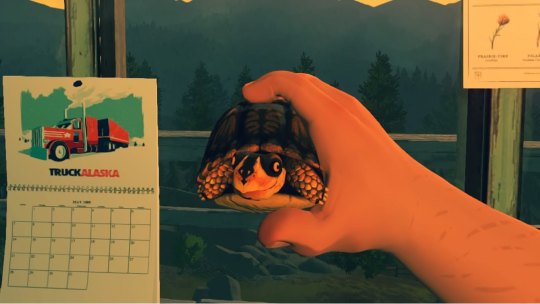
#11: Firewatch - Steam - ★★★★ - 2016
Firewatch has some very interesting character writing and storytelling, but it mostly made me really want to go camping. It's a great representation of what it's like to be in the wilderness around Yellowstone National Park, and just what it's like to hike around and just look at beautiful nature general. I really want to go back to the area now. Damn it.
People give a lot of guff towards these "walking simulator" style narrative-driven games, but I like them an awful lot. They're an interesting approach towards interactive storytelling, and the effect it has on immersing you in the role of its characters is interesting. That being said, Firewatch struggles between making Henry an established, known character, and you "playing" at being Henry. Henry makes a lot of decisions and conclusions that I, personally, would never do. He comes across as a real fuck up at times. Which is fine, I like flawed characters. But when I'm expected to deal with the repercussions of his decisions from a first-person perspective where I even have some amount of dialog choices, it's a bit weird. That's the nature of the medium, to be sure; you can't just let me decide to not go into the wilderness in the first place because then there's no game. But there's still this struggle between the narrative and our place in it that I don't feel like Firewatch necessarily gets wholly right. The contextual handling of decisions is crucial for Firewatch to work (turtle adoption included), but it seems in conflict with the story that they're trying to tell.
I enjoyed the narrative ride by and large, but the ending is abrupt on multiple levels. It feels deliberate and intentional, but I just didn't care for it. Some of that stems from a desire for more closure, but I also think their technical limitations may have caught up with them as well.

#10: Titanfall 2 - Origin - ★★★★ - 2016
Titanfall 2 is a lot of fun, but the experience is in many ways emotionally shallow.
The campaign has an abundance of really interesting design. Bouncing from the shooter equivalent of Powerhouse to committing egregious technochronomancy to what is in essence a HL2 gravity gun sequence to LOADING AUTOAIM DOT EXE, you can tell that the chapters were probably conceived independently of each other. While this might seem like a risk to a coherent overall flow, it results in a varied experience that doesn't dwell too long on any one idea. Mechanics as specific as "time travel" and "AUTO GUN" are introduced, explored, and then discarded before they can grow tired. It's a neat outcome of what must have been several teams prototyping a variety of gameplay designs, then building a framework to tie them all together. And it works!
The unfortunate side effect of this is that it was hard for them to layer a good, well-written, and evocative story over it. Because the game is haphazardly structured between these different extended sequences, there's not a lot of room for its cast and the narrative to breathe. The quality of writing leaves a lot to be desired. You'd think, "Weird gimmick mercs in giant robots challenging you one by one", Snake Eater meets Gundam, would write itself, but the game's refusal to take the time necessary to develop the cast makes each encounter emotionally empty. The lead is a shmuck best defined by being good at shooting men with robots, and his robot body is underutilized and then killed off.
The gameplay, both in singleplayer and in multiplayer, is challenging and fast without being too hectic, but it doesn't achieve the kind of flow I want in a shooter. I suppose that's what you get from a game that's essentially a Super CoD when all things are said and done. Still, I can crush people with a robot from orbit, which is pretty great.
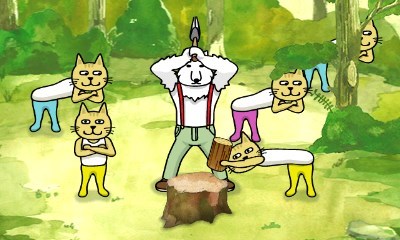
#9: Rhythm Heaven MEGAMIX - 3DS - ★★★★ - 2016
youtube
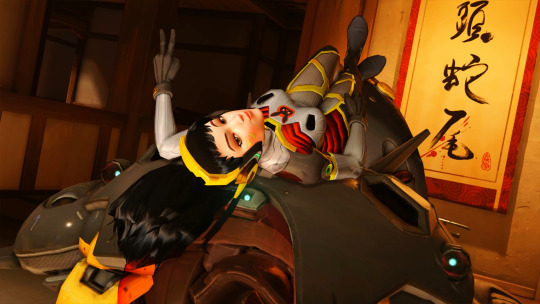
#8: Overwatch - Battle Net - ★★★★ - 2016
Say what you will about Blizzard. Maybe they always play it safe. Maybe their writing is always terrible. But man can they polish the hell out of a game. Overwatch is an immaculately well-polished team-based shooter. Each hero plays and feels really good and different. Where writing fails them, art and setting design triumphs. Blizzard has some of the most killer creative and art designers in the business.
While they certainly deserve the praise they get for the way they mesh TF2 and MOBA-style hero mechanics, I don't think they get nearly enough attention for how smart they are avoiding the feel-bad elements of those games. The way Overwatch lauds praise on players without surfacing negatives, even in defeat, is a fascinatingly effective bit of smoke and mirrors. Relentless surfacing individual successes without even showing the FPS standby of the kill/death ratio works to the game's benefit, and I can only imagine it has a lot to do with their success in shepherding in a more diverse audience that may not have a background in shooters.
Personally, I got a little bored with it after putting a few dozen hours in, but that's a pretty reasonable amount of time from a multiplayer shooter in my book. It's good. D.VA #1.

#7: Stellaris - Steam - ★★★★ - 2016
Stellaris is so close to being a truly great 4X game. The UI is phenomenal, the writing is good, and the varieties of weird things that can happen and that you can do are great. It's easily the most accessible game Paradox has ever made; as someone who has bounced off Crusader Kings 2 and its ilk every time, I easily picked up Stellaris and have put well over a hundred hours into it. As they continue to increment on it, I can see myself putting over a hundred more. The baseline gameplay loop is just VERY, VERY GOOD, and it's caused me to 4X time travel an embarrassing amount of times.
It's so close to being truly great, but there are a number of major issues Paradox still needs to address. Ship combat needs refinement; there's no real tactics, and barely any strategy. War is a slog; the current war goals mechanic makes it painstakingly slow to eke out a victory, even with an overwhelming power disparity. The game needs to support more variety in its playstyles; after a certain point it's kind of rote. Politics, both inside and outside of one's empire, are paper-thin; factions just don't matter at the moment. My xenophilic empires of weirdo alien delights are not nearly weird enough yet; let my race of dirty nasty boys give the xenophobes something to really hate.
I guess I'll have to live with it being a mostly great 4X game for the time being. This is one I'm in for the long haul.

#6: Abzu - Steam - ★★★★★ - 2016
Like Endless Ocean before it, Abzu is one of the few games that really captures the experience of diving; not so much the technical, grounded experience (which Endless Ocean, while quite fantastical itself, embodies more) but more the emotional experience of experiencing the majesty of the oceans. Abzu is an experience. While there's not much to it beyond just moving forward and looking at fish, the moving forward feels good, the fish look great, and there's some real good visuals and music throughout the ride.
I'm not entirely sure what all happened in it, but it was a relaxing time that made me want to dive more. Good work. Now I've spent hundreds of dollars on new diving gear.
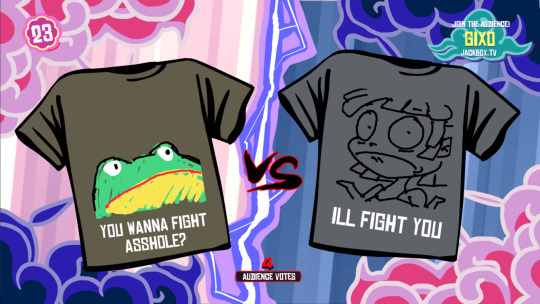
#5: Drawful 2 / Jackbox Party Pack 3 - Steam - ★★★★★ - 2016
I get the feeling that some permutation of Jackbox Games' party games will exist on my favorite game lists for the remainder of time, just because I really enjoy joking and drawing with my idiot friends. These games are fantastic if you hang with a crowd with like-minded senses of humor. The actual content of Party Pack 3 is a bit hit-and-miss, though TKO is such a standout that I don't care. The drawing ones typically are.
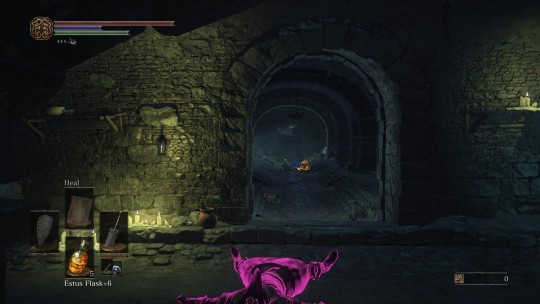
#4: Dark Souls 3 - Steam - ★★★★★ - 2016
It's kind of funny: one of my biggest complaints about Dark Souls 2 was how it didn't give a due amount of respect to its predecessor in its setting and story. Dark Souls 2 made the events of the first game into just the first in what is apparently an indefinite cycle of people-turning-into-assholes as death loses meaning and the world going haywire. I think part of my distaste stemmed from how it completely cast aside the religious undertones of the first game. I enjoy stories of gods and men, men stabbing gods as the world ends, and then men beginning a new dark age with really tall serpents with too many teeth. As far as I was concerned, that was the canon ending for the first Dark Souls, and Dark Souls 2 didn't really explain how we got from there to, well, Two.
Dark Souls 3 does a much better job playing tribute to its origins, through a lot more explicit explorations of the nature of the world, the mechanics of how the setting works, and the place of larger-than-life figures in it. Where Dark Souls 2 felt like Dark Souls More, Dark Souls 3 feels like Dark Souls Chapter 2: This Time It Ends. And end it does.
Thematic stuff aside, it's also just a good Souls game. There are some really fun location designs and boss fights. It doesn't have quite the absurd amount of interconnectedness that Dark Souls 1 had with its locations, but it was still kind of mind-blowing to come out of a swamp after a few hours and realize I'd looped back to the first area of the game again. I found myself also enjoying the very explicit Dark Souls 1 cameos, though it got a bit stupid in a few places. If you've played the game, you'll know the ones. Knights of Catarina continue to be great, though. Shine on you dullard onion sons.
If there's one real problem I have with the game, it's what they did with the poise mechanic. Whereas in the past it was a viable strategy to wear heavy armor, wield heavy weapons, and go to town because there was an invisible "poise" meter for resisting stagger (offsetting your own slowness to a degree), now EVERYTHING staggers. Fast weapons and low armor are the law of the land and the correct way to play. Their new invincibility-frame interpretation of poise outright sucks, and being Estoc'd to death again and again is a miserable way to go.
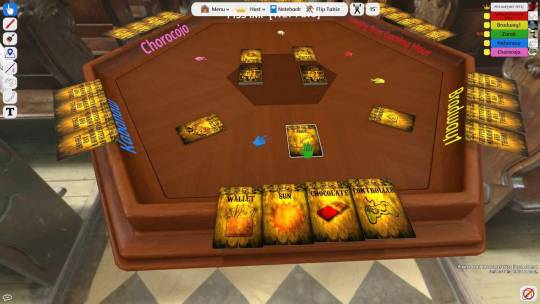
Tabletop Simulator - Steam - ★★★★★ - 2015
I don't actually have a lot of first-hand experience with tabletop games of any kind. I've certainly played the occasional board game, but I never really ran with that crowd for most of my life, and my parents have never been much in the way of the game-playing type beyond Scrabble. My exposure to tabletop gaming has a lot to do with my current circle of friends, and I've enjoyed them an awful lot.
Tabletop Simulator's strength is that it is any tabletop game that anyone takes the time to import into its engine. Which includes a lot of really, really good tabletop games as it turns out. It's a bit cheating, but that's the strength of it: it's hundreds of brilliant games in one, so long as you have the friends to play it with.
A lot of goofy improv, card games, and trivia have gone down in Tabletop Simulator for me over the last year. It's probably the game on this list I want to revisit the most, too, as it's a sure-fire way to have a real good time. I really want to play more Snake Oil. Snake Oil is a very good game.
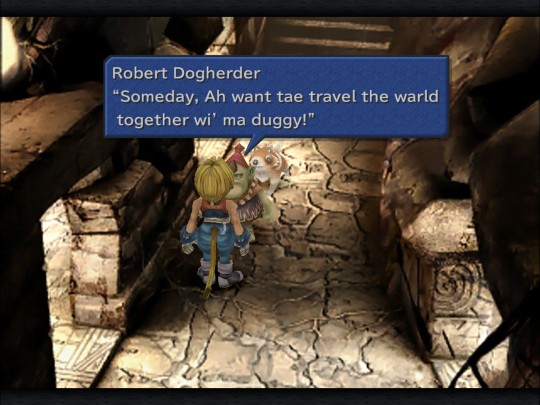
#3: Final Fantasy IX - Steam - ★★★★★ - 2016
Final Fantasy IX is REALLLLLLY GOOD. Like yes, I had heard this for ages, but it was never on a platform I owned. Finally it has come to Steam, and finally did I play it. And man: real good!
The gameplay is pretty standard JRPG fare for its original era. It's serviceable, but rather unchallenging and doesn't have much in the way of mechanical depth. But the quality of the characters and writing in the game make up for it in spades. I really enjoyed the main cast an awful lot, and liked how much more playful it was than its 3D predecessors (and successors). It's got a sweet love story, meaningful explorations of mortality, loss, and sacrifice, and you at one point save a tiny rat prince from a rather pissed off antlion.
The only thing I really dislike about the game are the oodles of strategy guide hooks that still remain and don't have much meaning in 2016. There are so many weird hidden things that are essentially impossible to divine without a guide (or, in my case, a helpful friend). None of them are mandatory or even crucial, but many of them are actually pretty interesting to the point where missing them would kind of stink. It's bizarre that beating the extra super boss (which admittedly I didn't do) rewards you with an in-game version of the strategy guide that just sits in your inventory as a final fuck-you note of "THERE'S ON WAY YOU'D HAVE MANAGED ANY OF THIS IF YOU HADN'T LOOKED IT UP HUH, THANKS FOR P(L)AYING".
I also could go the rest of my life never having to play Chocobo Hot-and-Cold again because man. MAN.
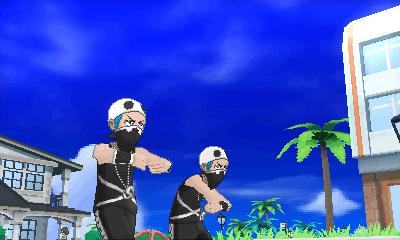
#2: Pokemon Moon - 3DS - ★★★★★ - 2016
Pokemon Moon is one of the best games in a franchise I adore. It, like its predecessors, is not a particularly challenging RPG. But building a team of weirdo goofball monster friends, raising them up, then doing battle with them against my friends, is really fun!. I am also the kind of weirdo with sincere opinions on the quality of Pokemon storytelling; namely, I want it to be really good AND really stupid.
Pokemon Moon diverges from past Pokemon games by dropping the badge-and-gym system and replacing it with a series of combat-adjacent trials. The switch allowed them to explore alternate ways of presenting Pokemon-based challenges while better using the gym-leader-stand-in trial captains and kahunas, who are all great. The fire island-challenge made me cry laughing. The cast is phenomenal, easily my favorite in the series.
The plot is not nearly as goofy or weird as some of the previous games (to be fair, it's hard to top X & Y's insanity), but the cast is sooooo much better and more likeable that it's hard to really care. The new faces are a diverse, eclectic bunch, and the cameos from old faces are also fantastic. I did not expect to find Grimsley, amateur Dracula, waiting on a beach wearing a kimono so he could give me a shark.
Mechanically, there's also a ton of quality of life improvements that eliminate much of the lingering frustrations that the series has been carrying with it for years now0. The elimination of HMs, the streamlining of breeding and IV stats-checking, and other minor improvements to the interface and menus make the game so much better than its predecessors.
Really, my only complaints about the game are tied to some issues with post-game grind, a much worse online interface system than the deeply integrated one in X&Y, and the fact that the Battle Tower and Battle Royale continue to be imbalanced, poorly structured, and huuuuge cheating pieces of shit. That's Pokemon for you.
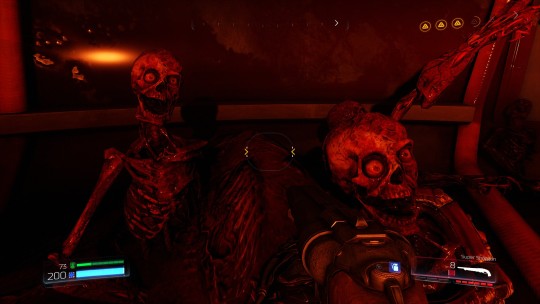
#1: Doom - Steam - ★★★★★ - 2016
DOOM is power.
DOOM is flow.
DOOM is violence.
DOOM is finding yourself surrounded by thirty dozen demons, each more capable of killing you than the last, and then just tearing them apart. DOOM is the lizard brain, the id, knowing how to murder everything around you while the ego is just barely hanging on for the ride.
DOOM gives you the tools and the means to take on everything that they put before you, and then says "Go." The cycle of killing enemies with your arsenal, using the melee takedowns to regain health, and then using the chainsaw to get ammo when you're running dry is beyond satisfying, it is... complete. It is mechanical perfection. Everything is as it is; everything is as it should be. It is combat as a dance, it is violence in motion. The music blares, it screams. The bass is your heartbeat.
Who would have thought DOOM could have a great story? That they would take one of the oldest, most generic franchises in history and turn it into something wonderful? It's the tale of a soulless corporation making the very logical decision to frack Hell so as to provide Earth with clean energy, turning their corporate infrastructure into a cult before awakening the DOOM Marine when it's far too late. The DOOM Marine is re-imagined not as some shmuck with a gun but instead a divine avenger, violence incarnate. The demons write scripture about your coming. Imps tell their kids scary stories about you. Hell announces your arrival on its infernal doorsteps with a rumbling, simple message on the dimension-wide intercom: "He's here." DOOM revolves around Hell doing ANYTHING to try to stop you, not because you can stop their plans, but because you will stop their plans. And that feels awesome.
I don't give a shit about their multiplayer, I don't care about snapmap. DOOM is the ultimate power fantasy. Play it on Ultra-Violence. Demonic presence is at unsafe levels, and we've got the double barreled shotgun needed to make things right.
#game of the year#2016#nonfiction#think piece#ghost trick#coast guard#death road to canada#fire emblem fates#transformers: devestation#forza horizon 3#american truck simulator#azure striker gunvolt#worms wmd#theatrythm final fantasy#guacamelee#XCOM 2#inside#firewatch#overwatch#rhythm heaven MEGAMIX#Stellaris#abzu#Drawful 2#doom#dark souls#final fantasy IX#goty2016#steam world#pokemon moon
17 notes
·
View notes
Link
Ion Storm Austin’s Deus Ex was a critical and commercial success when it was released in the summer of 2000, laying the groundwork for an enduring franchise.
More importantly, it inspired a generation of game designers to dig into the nooks, crannies, and conveniently-placed ducts of what we now shorthand as “immersive sims”, those games that ask players to make interesting choices in how they want to confront or slip past obstacles in their path.
Shortly after the game shipped, game director Warren Spector wrote a broad postmortem of the project. Today at GDC, he revisisted the subject after 17 years to shed some fresh insight into how the groundbreaking game came to be.
“People always ask me which of my games are my favorite; don’t ever ask a game designer that,” said Spector. “The closest I ever get to answering is saying that the game I’m most proud of is Deus Ex.”
Spector acknowledges that a lot of what he's talking about is standard practice in the game industry now, but he reminds fellow devs that it absolutely was not common practice 20 years ago when the game was first conceived.
“Conceptually, I thought of Deus Ex as a genre-busting game, which let me say, really enamored us to the marketing folks. They loved that,” said Sepctor. “If you ever want to make a marketing perosn unhappy, mash some genres together.”
The game was envisioned as a mix of first-person shooter, adventure game, and RPG. But Spector traces the history of its development back to playing tabletop games, long before he became a game designer.
"I would not be here, you would not be here, if not for that game of Dungeons and Dragons”
“Let me tell you were it began -- this is going to get a little embarrassing,” said Spector. “It all began with Dungeons and Dragons.”
In 1978, to be precise, when he started playing D&D with a new Dungeon Master.
“I would not be here, you would not be here, if not for that game of Dungeons and Dragons,” said Spector.
The Dungeon Master of that game was “cyberpunk guru” Bruce Sterling, and Spector says the experiene was meaningful not because of the story being told, but because of how it was being told -- by Spector and his friends, under the guidance of Sterling.
“The story belonged to Bruce, but every detail belonged to us,” said Spector. “I was completely hooked; I played in that campaign for ten years.”
So how does that lead to Deus Ex? Spector says it inspired his entire career in game design, a long-running attempt on his part to try and recreate that experience he had playing D&D for the first time in ‘78.
“That’s been my life mission: to recreate that feeling,” he said. “Every game I’ve worked on, every single one, has been trying to engage players in the telling of the story. My only hope is to do it a little better every time.”
So Spector became a game designer, and joined Origin Systems in 1989 to work on games like Ultima Underworld. But at some point he got tired of making those games, and he decided to “Try and swing for the fences.”
“I was sick to death of making games about guys in plate armor swinging swords,” said Spector. He says he wanted to make what he saw as a “real-world role-playing game” in which the player’s choices would say more about the player themselves than their in-game avatar
“I don’t care about your puppet; I care about you,” he said.
He also wanted every player to get to the end of the story; he wanted to tell a story with players the way Sterling told a story with him and his friends back in the ‘70s.
At Origin Systems he pitched a game concept that allowed him to do all this: something called (Trouble)shooter, which was a sort of hard-boiled noir game. Electronic Arts and Origin weren’t interested at all, and Spector shelved the idea. A few years past, he left Origin and joined Looking Glass, where a game called Thief was being developed.
Spector says he had a moment while playing Thief: he hit a part that was too tough to sneak through, and impossible to fight through. So he asked the team to make the player character tougher, so he could fight his way through; but the team balked, saying that wasn’t the point of Thief. The game was about sneaking, after all; it wouldn’t make sense to let players smash through a roadblock.
That, says Spector, was when he got the idea to go back to (Trouble)shooter. So he left Looking Glass shortly before Thief shipped, and wound up nearly signing a contract with Electronic Arts to make a totally different game.
“That’s when John Romero called me and said don’t sign the contract; join me at Ion Storm and make the game of your dreams,” said Spector. “Who can say no to that?”
And so Ion Storm Austin was born, with the game that would become Deus Ex as its debut project. But before work got underway, devs may appreciate Spector's recollection of asking himself a series of questions he calls the 6 + 2 + 1 -- a vetting process he says he applies to all games he works on.
“Why I don’t call them the nine questions, I don’t know,” said Spector. “But if I can’t answer any of these questions I don’t make the game.”
What’s the core idea? Can you describe the core of the game in 2-3 sentences?
Why do this game?
What are the development challenges?
How well-suited to games is the idea?
What’s the player fantasy? (If the fantasy and goals aren’t there, it’s probably a bad idea)
What does the player do? (What are the “verbs” of the game?)
Has anyone done this before?
What’s the one new thing? (“You can always find one thing that hasn’t been done before [in games], even if you’re making a My Little Pony game.”)
Do you have something to say? (“In Deus Ex I wanted to explore all sorts of big issues,” said Spector. “And I wanted players to explore those things in ways that only games could do.”)
All of these questions were answerable for Deus Ex, so in 1997 work on the project got underway at Ion Storm Austin.
“If we were gonna plug into the real cultural zeitgesit, we had to play close attention to things in the real world,” said Spector. Things like mechanically-augmented soldiers, or the rising tide of terrorism.
“You didn’t have to be a genius, even in 1997, to see that the news was increasingly filled with reports of terrorism,” he added.
”And really interesting to us was the rise of nanotechnology; the dangers of that seemed fun to explore. But most importantly, everywhere you looked in 1997, it seemed like there was a conspiracy theory,” said Spector. “The world of Deus Ex was being created all around us; we didn’t have to make anything up. It was great!”
In short, Spector says the game was designed to answer five big questions:
What would happen if you mashed up the adventure game, shooter, and RPG genres?
What would happen if you dropped a secret agent into a world wih no black and white -- just shades of grey?
What if all conspiracy theories were true?
What does it mean to be human in world with augmentation?
How should the world be? Would the world be better off ruled by a secret cabal, a sentient AI that connected all humankind, or plunged into a new dark age?
“The game was going to have no bosses to kill; it was about deciding how the world should be,” said Spector. “You could answer those questions through your play choices.”
To explore these questions in a game, Spector says he established some “commandments” for the team to follow:
Ion Storm Austin Commandments (or, the Deus Ex rules of roleplaying)
Always show the goal. Players should always see what they’re trying to accomplish.
Problems, not puzzles. “It’s an obstacle course, not a jigsaw puzzle.”
No forced failures. “Failure’s not fun.”
It’s “role” not “roll” -- ie.. “It’s about playing a role, not rolling dice,” said Spector. “Why do we still have character classes and skill levels and die rolls?”
If there’s cool stuff happening, players should be doing it. Players do the cool stuff; NPCs watch the players do the cool stuff.
Lay out constant rewards to drive players onward.
As the player gets better, make the game harder.
Think 3D. “I believe 3D maps can’t be laid out on graph paper; if players aren’t looking up and down constantly, you may as well make a 2D game.”
Be connected. Tunnels from A to B aren’t interesting, says Spector; interconnected spaces are.
Every problem should have multiple solutions.
By the time the team moved from the concept phase to pre-production, the Ion Storm Austin team had grown from 6 to about 30 people. It was a “totally dysfunctional team,” according to Spector, and the team had “about sixish months” of pre-production. The design document was cut down to 270 pages (“which nobody read”) and the team entered full production.
“You don’t want to know how many times I was told to just make a shooter, and I said no,” said Spector.
“Then there was the day we hit pre-alpha and realized the game was not fun; that was a good one,” recalled Spector. By this time, September of 1999, Spector says the game had finally come together and the team found out it wasn’t fun.
“Luckily, Eidos saw the potential of the game and gave us more time,” said Spector. “By June of 2000 it was ready to ship. It was the game of my dreams.”
He seems to really mean this, too; Spector says at the start of every project he closes his eyes and envisions what a game will be. By the time Deus Ex had shipped, he looked at it and recalled that “every single detail had changed, but in spirit it was exactly the same. It was kind of amazing; it’s the only time that’s ever happened.”
So what positive lessons were learned from the experience that fellow devs might appreciate? As you might expect, Spector had a list:
Don’t give up
“The lesson here is that if there’s a game you have to make, never give up, because someone’s gonna be stupid enough to give you the money some day.”
Have clear goals
“We wanted players thinking about who they were in the world...we wanted players to think about how they wanted to behave in the world,” said Spector. “We wanted them to feel like they were actually in the world….everything in the game had to be based on something real.”
“If there’s anyone in the audience here who worked on deus ex, I’m sure you hate me,” added Spector.
Don’t skimp on pre-production
“You can always use more, but we did okay,” said Spector.
Keep your game design organic -- be open to change
“Our game systems didn’t work as well in reality as I thought they would on paper,” said Spector.
Always have a playable build
“We always knew where we were, even if that was painful,” said Spector, explaining that the team would build out envisioned missions early, in limited form, to test how they played. These “proto-missions” were small and ugly, but critical to the game’s production because it helped the team see things that didn’t work, early enough to do something meaningful about it.
Also, says Spector, make sure to playtest with real people
“Do not let your publisher know you’re doing this,” said Spector, recounting how Ion Storm Austin would bring folks in to do playtests without telling Eidos. “Listening to their responses, I called that particular milestone the ‘wow these missions suck’ milestone.”
License good tech
“That was something we did right; we licensed Unreal Tournament,” said Spector. “Adding what we needed was much easier than it could have been...3 programmers made Deus Ex. They were very overworked.”
So what went wrong? What should you know to avoid in your own game projects?
The team structure didn’t work
“I had two people qualified to be lead designers so instead of picking one, I gave them both roles as lead designers with design teams,” said Spector. “Don’t do that. I thought I could manage the tension between the teams, and I couldn’t...I had to call one of the design teams 1 and the other one team A, because neither would be team B or 2.”
However, Spector took pains to say one thing he did right was in choosing who to hire. “Those guys do not get enough credit for the creative aspects of the game, the fact that we shipped at all, and managing the team.”
Goals were too big and unrealistic
“Harvey Smith and another designer, Steve Powers, came to me one day and said ‘you cannot make this game. We cannot make this story,'” recalled Spector. “So we cut a bunch, and the game was better for it.”
He recommends you limit yourself in a kind of creative box, and ensure your entire team is operating within it.
More risks should have been frontloaded
Put simply: Spector says devs should prototype more systems earlier so you can iterate and make them better -- or throw out what doesn’t work.
Be careful about licensing tech
“This is something that I said we did right, but it’s also something we did wrong,” said Spector. “Unreal Tournament was not designed to have a deep sim and allow fighting, sneaking and talking...we had to layer all that stuff in on top. It worked, but….we ended up faking a lot of stuff, to be frank.”
He also added that the engine presented the team from being able to create the large, open areas they envisioned, and he feels it significantly impacted the game.
“It was a mistake to try and recreate the real world...in 1997,” said Spector.
Any publicity is not good publicity
“Ion Storm was not a quiet company; I don’t know how many of you remember this,” said Spector, pulling up an image of an ad for Ion Storm Dallas’ Daikatana, also released in 2000. He went on to mention Playboy shoots in the office, articles about pay rates at Ion Storm, and more, noting that “it’s hard for everyone on your team to be productive when everyone’s screaming about your company.”
But when the game finally released in 2000, Spector says the results were gratifying: it sold well, reviewed well, and most importantly (according to him) players got excited about the notion of making meaningful choices in the game.
“Be ready to define success for any game you make; if you can’t define success, you are not ready to make that game,” said Spector. “Conversation was my definition of success.”
He’s talking about the sort of conversations that are now a common goal in game design: the “what did you do? How did you get through this part? What ending did you choose?” conversations between players who are playing through the same game in different ways.
“That was what Deus Ex was all about. It wasn’t about what the development team thought they world should be, but what the player thought the world should be,” said Sterling. “Like Bruce Sterling and every other Dungeon Master, we provided the skeleton of the experience and the players put meat on the bones.”
“Here’s my final thought for all of you: I sincerely hope that everyone of you gets the opportunity o work on the game of your dreams some day,” said Spector. “And I hope every one of you gets to work on something that’s still relevant 17 years after you make it, and has a life beyond you.”
0 notes